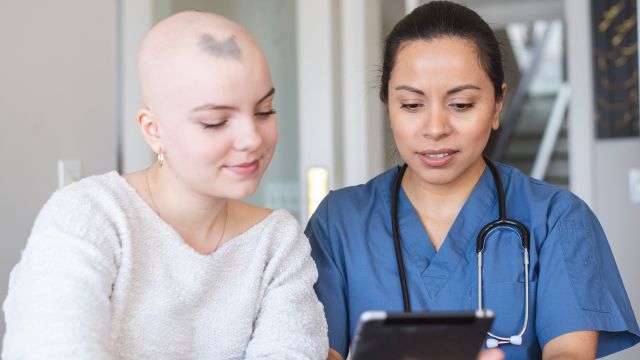Also called MBC, metastatic breast cancer is cancer that initially began in the breasts, but has metastasized, meaning it has spread to other areas of the body.
Each case of MBC is different. While the lungs, liver, bones and brain are the most common areas affected by MBC, breast cancer cells can spread to virtually any organ or tissue. Because of this, treating MBC is highly individualized process that takes into account the size, location and characteristics of the cancer calls, as well as many factors about the patient, including symptoms and medical history. There is no cure for MBC, but treatments can slow the spread of the cancer, relieve symptoms, prolong life and improve quality of life.
Here is an overview of some of the different approaches used to treat MBC.
Chemotherapy
Chemotherapy drugs are medicines that damage and kill cancer cells. Unfortunately, chemotherapy also damages healthy cells. There are more than a dozen different chemotherapy drugs that are used in the treatment of MBC, and chemotherapy is often used in combination with other treatments. As with any other treatment for MBC, the choice of what drugs or combination of drugs depends on the characteristics of the cancer, as well as the needs and medical history of the patient.
Hormonal therapy
Hormonal therapy is also known as endocrine therapy or antiestrogen treatment. When making a diagnosis, tests will be done to determine if the cancer cells are estrogen-receptor/progesterone-receptor positive (ER/PR positive). Cancer cells that are ER/PR positive can use the hormone estrogen to fuel their growth. Endocrine therapy works to reduce the levels of estrogen in the body or to block estrogen from being used by the cancer cells, taking away the means by which the cancer grows. There are a variety of medicines that fall into this category, and some may be used in combination with other treatments. Deciding on a treatment will depend on a number of factors, including whether or not a patient is pre- or postmenopausal.
Biologic therapy
Biologic therapies for MBC work by targeting specific proteins or processes that promote the growth of cancer cells, such as HER2 (human epidermal growth factor receptor 2), a protein that certain cancers can use to grow. During diagnosis, cancer cells will be tested to determine if they are HER2-positive. If the cancer cells are HER2-positive, your healthcare provider may prescribe a biologic treatment that can target and destroy those cancer cells.
Bone modifying agents (BMAs) are another biologic therapy, used to treat MBC that involves the bones. BMAs work by preventing normal processes that cause bone cells to break down, and are used to prevent complications such as fractures and relieve symptoms such as bone pain.
Surgery or radiation therapy
Surgery and radiation therapy (RT) are only used in some cases of MBC. These treatments are designed to target specific tumors and are not the best approach for treating cancer that has spread throughout multiple locations in the body. However, when a patient with MBC has a tumor in a location that is causing complications or poses a risk of complications—for example, a tumor that is applying pressure to the spinal cord or brain—surgery or radiation may be used to remove or shrink that specific tumor.
Deciding on a treatment
It’s important to remember that every case of MBC is different, and not every treatment is appropriate for every patient. When it comes to treating MBC, it is extremely important to work with a healthcare provider to get an accurate diagnosis. This includes information about the size, location, biology and other characteristics of the cancer, which will help inform your treatment plan. Patients today have many treatment options available that patients in previous years and decades, and published data shows that survival rates for MBC are improving.






